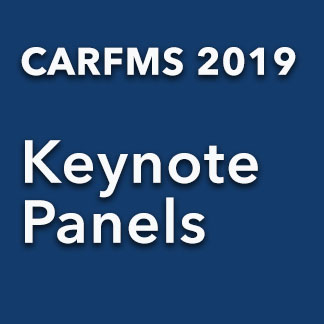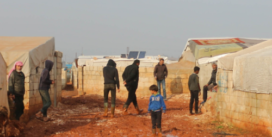- Fall Newsletter, 2025, Issue 15
- Using International Online Learning Modules to Engage Students in the Study of Critical Global Issues
- Upcoming Book Launch: Hearts of Freedom
- Announcing winners of the 2025 CARFMS Essay Contest
- The New York Declaration for Refugees and Migrants and its two Global Compacts: Addressing the Symptoms or the “Root Causes” of Forced Displacement?*
Keynote Panels

Elizabeth (Liz) Miller, Concordia University; Stéphanie Gasana, Ayanda Dube, Gracia Jalea
Re-Storying Narratives of Displacement
Too often stories of forced migration or resettlement are told by those in positions of power. These stories are then translated into public opinions and policies that can lead to exclusion or exploitation rather than support or integration. One way to reflect on and challenge both policies and pathways to integration is through the creation and circulation of first-person stories. How can we facilitate creative processes to support the creation of first-person narratives that address refugee, indigenous and climate migration experiences? What is the role of first-person stories in shifting how do we define, support and measure the integration of refugees into communities? And how can we foster processes to think with first-person stories in the formation of policies, practices, and curricula? Mapping Memories, a multi-year project, I brought together Montreal-based educators, filmmakers, policy advocates, organizers, students, and youth to develop participatory media projects for youth with refugee experience.
Emerimana Daniel Christian, URISE Initiative for Africa; Mustafa Alio, Refugee Career Jumpstart Project; James Madhier, University of Toronto
Refugee Agency and Influence in Multiple Spheres
Participation refers to the way in which refugees and others forcibly displaced can participate meaningfully and exert influence in decision-making processes that affect their lives. Participation can be used to describe different situations, from a person being able to make informed decisions and fully participate in a local labour market, through to groups of refugees being able to access democratic institutions and political processes (e.g. being able to elect representatives or vote). In the context of the workshop, the focus of discussions is on 1- The impact of the refugee participation on hosting community and their contributions. 2- How refugees and others forcibly displaced can participate (act) and have agency (influence) in decision-making processes at different levels (local, national, regional, global) and in different kinds of spaces (e.g. government, NGOs, community, academia).
